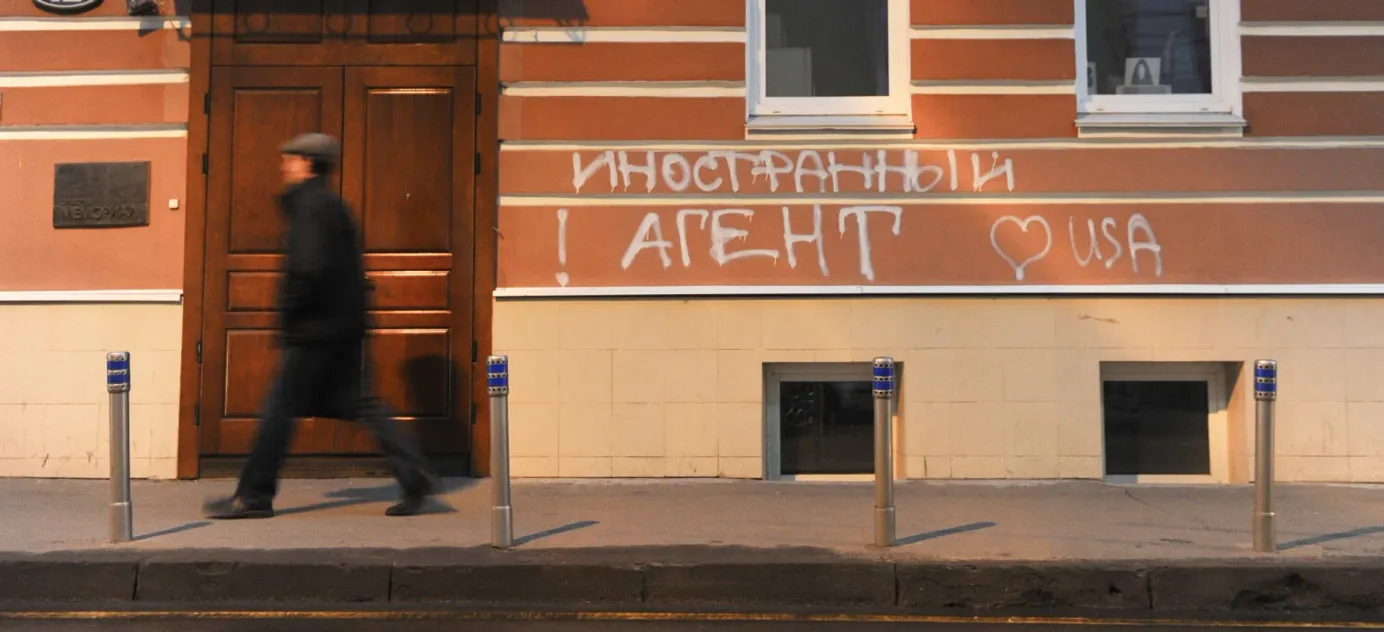
THE BELL WEEKLY: Russia targets foreign agents’ advertising income
Hello! This week we cover a new law designed to strip critical independent media of a key revenue stream. We also look at how Russians bid a final farewell to Alexei Navalny, and analyze more problems for the aviation industry.
New Russian law robs critical independent media of income
Russian authorities have found a new way to attack independent media outlets and journalists that aren’t loyal to the Kremlin, with a law that will make it illegal to pay for advertising with so-called “foreign agents” — both individuals and organizations. Advertising is an important revenue source for many Russian media projects that have been labeled foreign agents. Some active media outlets with audiences in the millions have already been forced to shut down or suspend operations as their income has dried up.
- Russia officially designates people or organizations that conduct political activities in the interests of another country or receive funding from abroad as “foreign agents”. In reality, these criteria do not always have to be met, and the authorities can label anybody a foreign agent for pretty much any reason they like, such as taking a public stance critical of the Kremlin, the war in Ukraine or campaigning against specific policies, such as the repression of the LGBT+ community. These days, the quickest route to becoming a foreign agent is operating an independent media outlet that doesn’t cave in to the Kremlin’s control and censorship. Individual journalists, public figures and anti-war activists are regularly added to the list of foreign agents, which keeps growing and now stands at more than 700 entries — including The Bell. Independent lawyers in Russia argue that the label, which has Soviet-era espionage connotations, is discriminatory.
- Russian authorities have long sought ways to deprive opponents of the war — including critical media outlets that have moved abroad — of their income in order to curtail their ability to report on and criticize the offensive. State Duma Speaker Vyacheslav Volodin announced the latest measures at the start of February, claiming that lawmakers had “received many queries” about why Russian companies were continuing to place adverts on the websites of foreign agents. In under three weeks the bill has swept through the lower house of parliament and will now go to the Federation Council for approval before being signed into law by President Vladimir Putin. There is no doubt it will sail through this process.
- Before it has even come into force, the bill has already had its intended effect. At least two independent media projects with audiences in the millions have announced suspensions or reorganizations. Journalist Katerina Gordeeva, presenter of the Skazhi Gordeeva YouTube channel (1.65 million followers) announced she would suspend the project, and Alexei Pivovarov, who set up the Redaktsiya channel (4 million followers) had to release most of his team and transfer the rights to the Telegram channel to his remaining employees.
- It’s possible other projects will announce similar changes. Opposition activist and blogger Maxim Katz (who has 2.1 million followers on YouTube) told The Bell that major advertisers already left as soon as he was branded a foreign agent. Advertising makes up 25% of his channel's revenue, he said, and once this law is passed the channel, in its current format, would be unprofitable. “The impact will be noticeable,” he said. “We will ask viewers to make donations and we'll reduce costs, turning away from expensive filming.”
- Russian independent media has for many years relied on audience donations to support its work. Long before this law, foreign agents already faced a de facto ban on advertising, with most Russian-based companies unwilling to work with them. Many publications were also designated “undesirable organizations,” a label with much more oppressive restrictions that puts anybody who works with them at risk of being jailed for four years. Both the Dozhd TV channel and the Meduza news site have been named undesirable. Meduza lost about 70% of its advertising revenue in 2021 after the decision, but survived thanks to a successful crowdfunding campaign, communications director Katerina Abramova told The Bell.
Why the world should care
In a media landscape dominated by censorship and propaganda, Russia's independent media and YouTube projects are a breath of fresh air for millions of people. They offer a rare space to speak openly and honestly about the state of affairs in the country. Clearly, this does not suit the authorities. In response, the Kremlin has cast them as “foreign agents” — enemies of the state — and is tightening the screws to deprive journalists of legitimate revenue streams that fund their work.
The Bell is now listed as “a foreign agent” in Russia: our website is blocked, we can no longer raise money through advertising, and our business model is in ruins. Journalists in Russia face greater risks than ever before. Repressive new laws threaten up to 15 years in jail for objective reporting.
However, we are not about to give up. This newsletter is our newest project. It presents an in-depth analysis of the Russian economy, which has survived the first year of the war but is becoming ever more secretive. We will try and shed some light on what’s going on. Each edition will tackle a part of the big question: how long can the Russian economy endure under sanctions and when will the Kremlin run out of money for its war?
We don’t want to have to charge a fee for our newsletters. However, if The Bell is to continue its work, we need your support.
You can make a donation here. It will help our journalists continue investigating stories, breaking news and publishing newsletters.
Russia says its final farewell to Navalny
Thousands of people took to the streets to see Russian opposition leader Alexei Navalny take his final journey on Friday at his funeral service and burial in Moscow. Despite fears of a widespread crackdown, the police refrained from mass arrests, even as the crowds chanted banned anti-war slogans.
- Navalny, an Orthodox Christian, had a private funeral service at a church in the Maryino district of Moscow where he had lived for many years with his family. As is tradition, he was placed in the center of the church in an open casket. The ceremony was attended only by his family members still in Russia (not his wife, Yulia, their children or his brother, Oleg, who are all in exile) and a few others who managed to get inside the church. After the service, the coffin was closed and Navalny’s body was driven to a nearby cemetery to be interred.
- The thousands of mourners unable to enter the church filed down to the cemetery in a huge column to pay their final respects to the opposition leader.
- Navalny’s coffin was lowered into the ground to the soundtrack of Terminator 2, his favorite film, and Frank Sinatra’s My Way. The comments section on the My Way track on YouTube has since turned into a book of remembrance for the late politician.
- According to the most conservative estimates, 16,500 people came to the cemetery on the day of the burial. Although the crowds chanted anti-war slogans and recited Navalny's name – something that several Russian courts recognize as “extremist symbols”, the police made just six arrests.
- Thousands more came to the cemetery over the weekend to lay flowers and place placards at Navalny’s grave. By Sunday there were so many bunches of roses and carnations that the Orthodox cross at the head of the grave had been completely covered in flowers.
Why the world should care
Russia has lost its leading independent politician and probably the only serious rival to Vladimir Putin. In two weeks, the president will be re-elected for his fifth term of office, a mandate that will keep him in power until 2030.
Aircraft delays
- Russia’s aviation industry is among the hardest hit by Western sanctions imposed over Moscow’s invasion of Ukraine. Airlines lost access to leased Airbus and Boeing aircraft and could no longer easily buy parts to service their fleets. A multi-billion-dollar state program to produce home-made planes was meant to solve the problem, with the first slated for delivery later this year. Instead, the mobilization of the economy to support the war has eaten up production capacity and Russia has not been able to source key parts, meaning delivery dates have been pushed back several years already. It’s far from clear whether the promised Russian-made civilian planes will be put into the sky even within the new timeframe.
- Russia’s fleet of Western jets was supposed to be replaced with four aircraft currently under development — the Sukhoi Superjet 100 (SJ-100), the Irkut MC-21, the Tupolev Tu-214, and the Ilyushin Il-114. They were set to start entering service in 2024, but the planned launch dates have now been pushed back to 2025-2026. The industry currently plans to deliver almost 600 of the planes by the end of the decade (142 SJ-100s, 270 МС-21s, 70 Il-114s and 115 Тu-214s)
- The flagship plane in this massive import substitution project is the mid-range MC-21, which was first due to enter mass production back in 2017 (the date was repeatedly delayed, even before Russia invaded Ukraine and was hit with a barrage of sanctions). So far off track is the development that Rostec, the state corporation responsible for high-tech manufacturing, had admitted that it still doesn't even know what the new version of the plane will look like. “The final appearance of this completely import-substituted aircraft will be formed in the second half of this year,” it said.
- That isn’t the only problem with the МС-21. According to sources quoted by several Russian media outlets (1, 2), the specifications of the plane do not meet the original plan either. Its range has been cut from 5,000km to 3,500km, and passenger capacity will be almost halved — 115 rather than 211. The current МС-21 has a maximum altitude of just 7,000 meters — comparable Western aircraft (such as the Airbus A320 and Boeing-737) can reach 12,000 meters.
- Experts do not believe that Russian airlines will suffer greatly from the delays. Since 2022, the size of the Russian fleet is down 10%, but passenger traffic dropped 18%. At the same time, sanctions mean that Russian airlines have lost many of their international routes, and domestic passenger traffic is close to its limit.
Why the world should care
Although the Russian authorities love to hail the success of their import substitution programs, it cannot come close to replacing everything that has been lost through sanctions. The latest round of delays to the country’s flagship airline replacement plans highlights how difficult it is for Russian industry to both adapt to sanctions and ramp up output at a time when production facilities are firmly geared towards serving the military.




